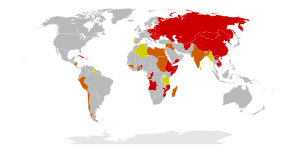
The following are lists of current and former states that claimed to be communist states.

The following are lists of current and former states that claimed to be communist states.
The following countries are one-party states in which the institutions of the ruling communist party and the state have become intertwined. They are adherents of Marxism–Leninism. They are listed here together with the year of their founding and their respective ruling parties. [1]
| Country | Local name | Since | Ruling party | Ideology |
|---|---|---|---|---|
| Chinese :中华人民共和国 Pinyin: Zhōnghuá Rénmín Gònghéguó | 1 October 1949 | Socialism with Chinese characteristics | ||
| Spanish : República de Cuba | 1 January 1959 24 February 1976 (communist constitution adopted) | |||
| Lao : ສາທາລະນະລັດ ປະຊາທິປະໄຕ ປະຊາຊົນລາວ Lao romanisation: Sathalanalat Paxathipatai Paxaxon Lao | 2 December 1975 | Kaysone Phomvihane Thought | ||
| Vietnamese: Cộng hòa xã hội chủ nghĩa Việt Nam | 2 September 1945 (North Vietnam [nb 2] ) 30 April 1975 (South Vietnam) 2 July 1976 (unified) | Ho Chi Minh Thought |
Although founded as a Marxist–Leninist state, North Korea began moving away from orthodox Marxism–Leninism and replaced all references to Marxism–Leninism in the Constitution of North Korea with Juche in 1992. [2] In 2009, the constitution was quietly amended so that not only did it remove all Marxist–Leninist references present in the first draft, but it also dropped all reference to communism. [3] According to North Korea: A Country Study by Robert L. Worden, Marxism–Leninism was abandoned immediately after the start of de-Stalinisation in the Soviet Union and it has been totally replaced by Juche since at least 1974. [4] The government's official ideology is now the Juche part of Kimilsungism–Kimjongilism policy of Kim Il Sung as opposed to orthodox Marxism–Leninism. The ruling Workers' Party of Korea reinstated its goal towards communism in 2021. [5] Some communists, especially the anti revisionists, call the DPRK a non marxist socialist state.
| Country | Local name | Since | Ruling party | Ideology |
|---|---|---|---|---|
| | Korean : 조선민주주의인민공화국 MR: Chosŏn Minjujuŭi Inmin Konghwaguk | 9 September 1948 | Kimilsungism–Kimjongilism |
There are multi-party states with communist parties leading the government. Such states are not considered to be communist states because the countries themselves allow for multiple parties and do not provide a constitutional role for their communist parties. Nepal was previously ruled by the Nepal Communist Party, the Communist Party of Nepal (Unified Marxist–Leninist), and the Unified Communist Party of Nepal (Maoist) between 1994 and 1998 and then again between 2008 and 2018 while states formerly ruled by one or more communist parties include San Marino (1945–1957 and 1978-1990), Moldova (2001–2009), Cyprus (2008–2013), and Guyana (1992–2015).
Nicaragua has been ruled by a socialist party from 1979–1990, and from 2007 on by Daniel Ortega, who is a Sandinista.
Venezuela is currently ruled by Nicolás Maduro, who has been President since 2013 (disputed since 2019). Maduro is the leader of the United Socialist Party of Venezuela (PSUV), which is considered far-left and Marxist. [6]
During the socialist Free Peru party's rule over Peru, many international observers described the party as being somewhat Marxist [7] [8] [9] or even Marxist–Leninist. [10] [11]
In 2024, Anura Kumara Dissanayake of the Marxist-Leninist Janatha Vimukthi Peramuna (JVP) was elected President of Sri Lanka, and the JVP's broader coalition, National People's Power won a landslide in parliamentary elections shortly thereafter. This represents the first time a communist party has been the ruling party of Sri Lanka. [12]
| ||
| Officially ruling parties in communist states Communist parties as ruling parties or part of a governing coalition in multi-party states Formerly ruling in a one-party system Formerly ruling in a parliamentary majority or minority government Formerly ruling as a coalition partner or supporter |

The following communist states were socialist states committed to communism. Some were short-lived and preceded the widespread adoption of Marxism–Leninism by most communist states.
Casting himself as a man of the people, Mr Castillo was rarely seen without the traditional white, broad-rimmed hat of his Cajamarca region, and a huge inflatable pencil, the symbol of his Marxist Free Peru party which also represents his background in education.
References for when the individuals were elected to the office of CCP leader, the name of the offices and when they established and were abolished are found below.
{{cite book}}: CS1 maint: numeric names: authors list (link)